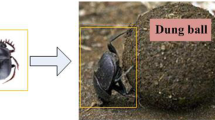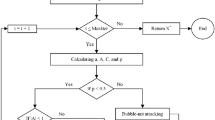Abstract
The discount {0–1} knapsack problem (D {0–1} KP) is a new variant of the knapsack problem. It is an NP-hard problem and also a binary optimization problem. As a new intelligent algorithm that imitates the leadership function of wolves, the grey wolf optimizer (GWO) can solve NP problems more effectively than accurate algorithms. At the same time, the GWO has fewer parameters, faster calculations, and easier implementation than other intelligent algorithms. This paper introduces a method of adaptively updating the prey position of wolves and a differential evolution operator with a scaling factor that adaptively changes according to the number of iterations, and selects which operator to use for iteration by the value of the search agent parameter. Finally, it combines the improved greedy repair operator based on D {0–1} KP to form the adaptive grey wolf optimization with differential evolution operator (de-AGWO). The experimental results of the standard test function prove that the algorithm in this paper has a significant improvement in function optimization performance. And the experimental results of D {0–1} KP shows that the proposed algorithm yields superior solution outcomes, except for unrelated datasets, and exhibits significant advantages when solving strongly correlated datasets. Finally, it is verified that more than 80% of the iterations utilize the grey wolf evolution operator, highlighting that the core of the algorithm remains the GWO.




Similar content being viewed by others
References
Guldan B (2007) Heuristic and exact algorithms for discounted knapsack problems. Master thesis, University of Erlangen-Nu ¨rnberg, Germany.
He Y-C, Wang X-Z, Li W-B et al (2016) Research on genetic algorithms for the discounted 0–1 knapsack problem. Chinese J Comput 39(12):2614–2630
Mirjalili S, Mirjalili SM, Lewis A (2014) Grey wolf optimizer. Adv Eng Softw 69:46–61
Zhu H, He Y, Wang X, Tsang ECC (2017) Discrete differential evolutions for the discounted 0–1 knapsack problem. Int J Bio-Inspired Comput 10(4):219
Kellerer H, Pferschy U, Pisinger D (2004) Knapsack problems. Springer, Berlin
Azad AK, Rocha AMAC, Fernandes EMGP (2014) A simplified binary artificial fish swarm algorithm for 0–1 quadratic knapsack problems’. J Comput Appl Mathematics 259(4):897–904
Babukarthik RG, Dhasarathan C, Kumar M, Shankar A, Thakur S, Cheng X (2021) A novel approach for multi-constraints knapsack problem using cluster particle swarm optimization. Comput Electric Eng 96:107399
Li VC, Curry GL (2005) Solving multidimensional knapsack problems with generalized upper bound constraints using critical event tabu search. Comput Oper Res 32(4):825–848
Poirriez V, Yanev N, Andonov R (2009) A hybrid algorithm for the unbounded knapsack problem. Discret Optim 6(1):110–124
Lai X et al. (2020) Diversity-preserving quantum particle swarm optimization for the multidimensional knapsack problem. Exp Syst Appl (2020):113310.
Syarif A et al (2020) Comparing various genetic algorithm approaches for multiple-choice multi-dimensional knapsack problem (mm-KP). Int J Intell Eng Syst 13:455–462
Xie X, Feng JL (20017) A mini-swarm for the quadratic knapsack problem. Swarm Intell Symposium IEEE, 2007:190–197.
Lin GY, Lu Y, Yao DD (2008) The stochastic knapsack revisited: switch-over policies and dynamic pricing. Oper Res 56(4):945–957
Dizdar D, Gershkov A, Moldovanu B (2011) Revenue maximization in the dynamic knapsack problem. Theor Econ 6(2):157–184
Rong A, Figueira JR, Klamroth K (2012) Dynamic programming based algorithms for the discounted 0–1 knapsack problem. Appl Math Comput 218(12):6921–6933
He YC, Wang XZ, He YL, Zhao SL, Li WB (2016) Exact and approximate algorithms for discounted 0–1 knapsack problem. Inf Sci 369:634–647
Feng Y, Wang GG, Li W, Li N (2017) Multi-strategy monarch butterfly optimization algorithm for discounted {0–1} knapsack problem. Neural Comput Applic: 1–18.
Feng YH, Wang GG (2018) Binary moth search algorithm for discounted 0–1 knapsack problem. IEEE Access 6(99):10708–10719
Cauteruccio F, Terracina G, Ursino D (2020) Generalizing identity-based string comparison metrics: framework and techniques. Knowledge-Based Syst, 187(Jan.), 104820.1–104820.17.
Jayabarathi T, Raghunathan T, Adarsh BR, Suganthan PN (2016) Economic dispatch using hybrid grey wolf optimizer. Energy 111:630–641
Zhang S, Zhou Y, Li Z, Pan W (2016) Grey wolf optimizer for unmanned combat aerial vehicle path planning. Adv Eng Softw 99:121–136
Chandramohan D, Dumka A, Dhilipkumar V, Loganathan J (2020) Data dissemination for green-vanets communication: an opportunistic optimization approach. Int J Pervasive Comput Commun, ahead-of-print.
Panwar LK, Reddy S, Verma A, Panigrahi BK, Kumar R (2018) Binary grey wolf optimizer for large scale unit commitment problem, Swarm. Evol Comput 38:251–266
Luo K, Zhao Q (2019) A binary grey wolf optimizer for the multidimensional knapsack problem. Appl Soft Comput 83:105645
Camacho Villalón CL, Thomas S, Dorigo M (2020) Grey wolf, firefly and bat algorithms: three widespread algorithms that do not contain any novelty. Swarm Intelligence: 12th International Conference, ANTS 2020, LNCS 12421, Springer, 121–133. DOI: https://doi.org/10.1007/978-3-030-60376-2_10.
Camacho-Villalón CL, Dorigo M, Stützle T (2022) Exposing the grey wolf, moth-flame, whale, firefly, bat, and antlion algorithms: six misleading optimization techniques inspired by bestial metaphors. Int Trans Operat Res. https://doi.org/10.1111/itor.13176
Deb K, Datta R (2010) A fast and accurate solution of constrained optimization problems using a hybrid bi-objective and penalty function approach.:1–8.
Alsuwaiyel MH (2009) Algorithms design techniques and analysis. World Scientific Publishing Company, Singapore
Coello, Carlos AC (2002) Theoretical and numerical constraint-handling techniques used with evolutionary algorithms: a survey of the state of the art. Comput Methods in Appl Mech Eng 191. 11–12(2002):1245–1287.
Michalewicz Z (1996) Evolutionary algorithms for constrained parameter optimization problems. Evol Comput 4(1):1–32
Saremi S, Mirjalili SZ, Mirjalili SM (2015) Evolutionary population dynamics and grey wolf optimizer. Neural Comput Appl 26(5):1257–1263
Heidari AA, Pahlavani P (2017) An efficient modified grey wolf optimizer with Lévy flight for optimization tasks. Appl Soft Comput 60:115–134
Luo K (2019) Enhanced grey wolf optimizer with a model for dynamically estimating the location of the prey. Appl Soft Comput 77:225–235
Wu C, He Y, Chen Y et al (2017) Mutated bat algorithm for solving discounted 0–1 knapsack problem. J Comput Appl (China) 37(5):1292–1299
Author information
Authors and Affiliations
Corresponding author
Ethics declarations
Conflict of interest
The authors declare that they have no known competing financial interests or personal relationships that could have appeared to influence the work reported in this paper.
Data availability
The hyperlinks to the datasets used in this paper are as follows: https://github.com/whutcold/data.
Additional information
Publisher's Note
Springer Nature remains neutral with regard to jurisdictional claims in published maps and institutional affiliations.
Rights and permissions
Springer Nature or its licensor (e.g. a society or other partner) holds exclusive rights to this article under a publishing agreement with the author(s) or other rightsholder(s); author self-archiving of the accepted manuscript version of this article is solely governed by the terms of such publishing agreement and applicable law.
About this article
Cite this article
Wang, Z., Fang, X., Gao, F. et al. An adaptive grey wolf optimization with differential evolution operator for solving the discount {0–1} knapsack problem. Neural Comput & Applic (2023). https://doi.org/10.1007/s00521-023-09075-x
Received:
Accepted:
Published:
DOI: https://doi.org/10.1007/s00521-023-09075-x




